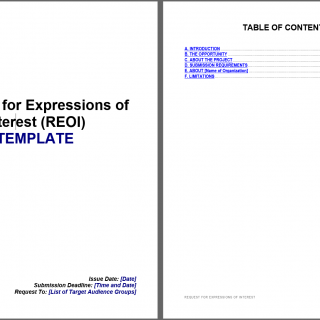Request for Expressions of Interest (REOI)
The Request for Expressions of Interest (REOI) form is a document used to request preliminary indications of interest from potential suppliers or service providers for a particular project or opportunity. The main purpose of this form is to gather information about potential suppliers or service providers, allowing the parties involved to determine the suitability of each party and determine the next steps in the procurement process.
The REOI form typically consists of several parts, including an introduction or cover letter, a description of the project or opportunity, and a section for potential suppliers or service providers to provide their contact information and indicate their interest. Important fields to consider when compiling the form include the name of the potential supplier or service provider, their contact information, and details about their qualifications and experience.
Parties involved in the REOI form include the organization or individual requesting expressions of interest and potential suppliers or service providers. It is important to consider any specific requirements or regulations that may apply to the project or opportunity, as well as any documents that may need to be attached to the form, such as a company profile or references.
Application examples of the REOI form include requesting expressions of interest for a construction project, a consulting engagement, or a software development project. Use cases for the REOI form include evaluating potential suppliers or service providers based on their qualifications and experience, and determining the next steps in the procurement process.
Strengths of the REOI form include allowing parties to gather information about potential suppliers or service providers in a timely and efficient manner. Weaknesses include the potential for incomplete or inaccurate information, as well as the possibility of multiple parties expressing interest. Opportunities include the potential for new partnerships or collaborations, while threats may include competition from other potential suppliers or service providers.
Alternative forms or analogues of the REOI form include requests for proposals or invitations to tender. The main difference between these forms is the level of detail and commitment involved, with a request for proposals typically requiring more detailed information and a higher level of commitment than an REOI form.
The REOI form can affect the future of the participants by providing a preliminary indication of interest and allowing for further discussions or negotiations. The form is typically submitted electronically or by mail, and is often stored in a database or file system for future reference.

